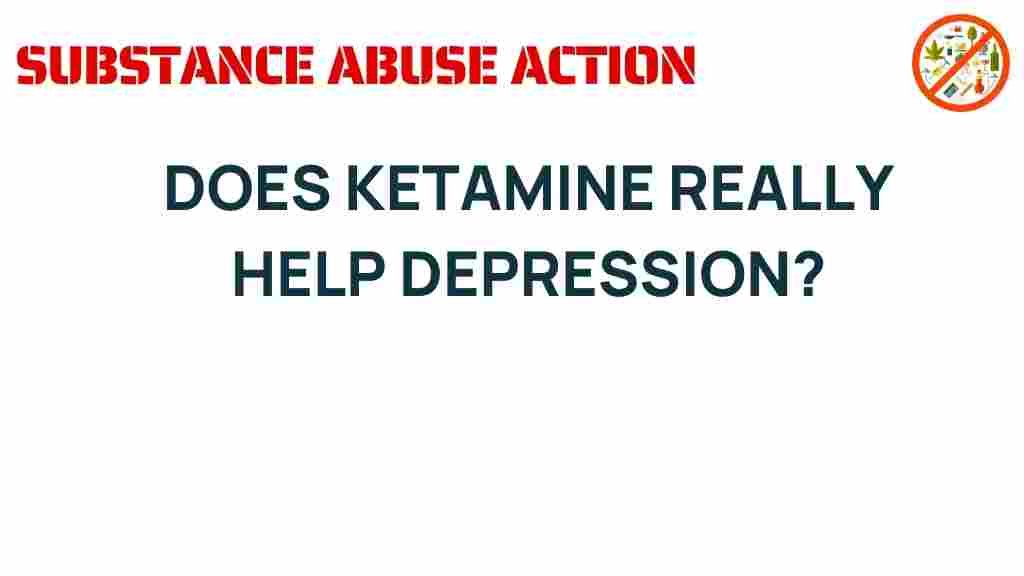Unraveling the Truth: Does Ketamine Really Help with Depression?
In recent years, the landscape of depression treatment has seen a significant shift with the emergence of new options. One such option that has garnered attention is ketamine, a drug traditionally used as an anesthetic. As mental health issues, particularly mood disorders like depression, continue to affect millions globally, the search for effective therapies is more crucial than ever. In this article, we will explore the effectiveness of ketamine in treating depression, the underlying research, and its potential as a viable alternative medicine.
What is Ketamine?
Ketamine is a medication primarily used in human and veterinary medicine as an anesthetic. It has gained popularity in recent years for its off-label use in treating severe depression, especially in cases where traditional medications have failed. Originally developed in the 1960s, ketamine is known for its rapid onset of action, providing relief from depressive symptoms much faster than conventional antidepressants.
Understanding Depression and Its Impact on Mental Health
Depression is a complex mental health disorder that can significantly impair daily functioning and quality of life. Symptoms may include:
- Persistent feelings of sadness or hopelessness
- Loss of interest in previously enjoyable activities
- Changes in appetite and sleep patterns
- Difficulty concentrating or making decisions
- Thoughts of self-harm or suicide
Despite the availability of various treatments, many individuals with depression do not find relief through standard therapies, leading researchers to explore alternative treatments such as ketamine.
The Mechanism of Action: How Ketamine Works
Ketamine’s effectiveness in treating depression is attributed to its action on the brain’s neurotransmitter systems. Unlike traditional antidepressants that typically target serotonin or norepinephrine, ketamine primarily acts on the NMDA receptor, a type of glutamate receptor. This action leads to:
- Increased levels of glutamate, enhancing synaptic plasticity
- Stimulated production of brain-derived neurotrophic factor (BDNF), which supports neuronal growth
- Rapid relief from depressive symptoms
These unique properties make ketamine a powerful candidate for treating severe depression, especially in cases where other treatments have failed.
Research on Ketamine’s Effectiveness in Depression Treatment
Numerous studies have examined the effectiveness of ketamine in psychiatric care, revealing promising results. Some key findings include:
- A study published in the American Journal of Psychiatry found that ketamine significantly reduced suicidal thoughts in patients with treatment-resistant depression.
- Another research article in Biological Psychiatry indicated that patients receiving ketamine infusions experienced a rapid decrease in depressive symptoms within hours.
- A meta-analysis of multiple clinical trials concluded that ketamine is effective in reducing symptoms of depression, with a notable response rate compared to placebo.
These studies highlight ketamine’s potential as a viable depression treatment option, particularly for those who have exhausted other therapies.
Step-by-Step Process of Ketamine Treatment
The process of receiving ketamine treatment typically involves several stages:
- Consultation: The first step involves a thorough evaluation by a mental health professional to assess the individual’s history of depression and previous treatments.
- Preparation: If deemed appropriate, the patient is prepared for treatment. This may involve discussing potential side effects and setting expectations.
- Administration: Ketamine can be administered via intravenous (IV) infusion, intranasal spray, or intramuscular injection. The IV infusion method is the most common.
- Monitoring: During and after the treatment, patients are monitored for any adverse effects and to evaluate the treatment’s effectiveness.
- Follow-Up: Regular follow-up appointments are crucial to assess the patient’s progress and determine if additional treatments are necessary.
Effectiveness of Ketamine for Depression
The effectiveness of ketamine as a depression treatment can vary among individuals. While many patients report rapid improvement in symptoms, others may experience limited benefits. Factors influencing effectiveness may include:
- The severity of the depression
- History of previous treatments
- Individual brain chemistry
It is essential for patients to discuss their expectations and experiences with their healthcare providers to tailor treatment plans effectively.
Potential Side Effects and Risks
While ketamine can be an effective treatment for depression, it is not without risks. Some potential side effects include:
- Dizziness or lightheadedness
- Increased blood pressure
- Dissociation or altered perception
- Nausea
Patients should be aware of these risks and have open discussions with their healthcare providers about any concerns.
Ketamine as an Alternative Medicine
The growing interest in ketamine for treating mood disorders has positioned it as a notable player in the realm of alternative medicine. For many patients who have not responded to traditional antidepressants, ketamine offers a new hope. Its rapid action and effectiveness in severe cases make it a compelling option in the field of mental health.
Considerations Before Starting Ketamine Treatment
Before embarking on ketamine treatment, consider the following:
- Eligibility: Not everyone is a candidate for ketamine therapy. A comprehensive evaluation by a mental health professional is necessary.
- Cost: Ketamine treatments can be expensive and are often not covered by insurance. Patients should inquire about costs upfront.
- Long-Term Effects: Research on the long-term effects of ketamine is still ongoing. Patients should weigh the benefits against potential risks.
Engaging in an informed discussion with a healthcare provider can help individuals make the best decisions regarding their mental health.
Conclusion: The Future of Ketamine in Depression Treatment
As the field of mental health continues to evolve, ketamine stands out as a novel option for treating depression, particularly in cases where other treatments have failed. While its rapid effects and unique mechanism of action offer hope for many, it is essential to approach treatment thoughtfully and with the guidance of qualified professionals. With ongoing research and growing interest, ketamine may pave the way for new therapies that can effectively address mood disorders and transform the landscape of psychiatric care for years to come.
For more information on mental health resources, you can explore the National Institute of Mental Health’s website here.
This article is in the category Treatment and created by SubstanceAbuseAction Team
